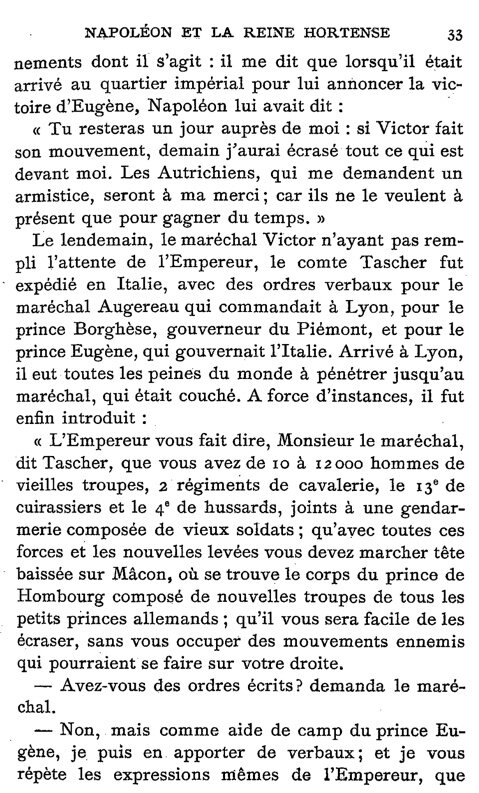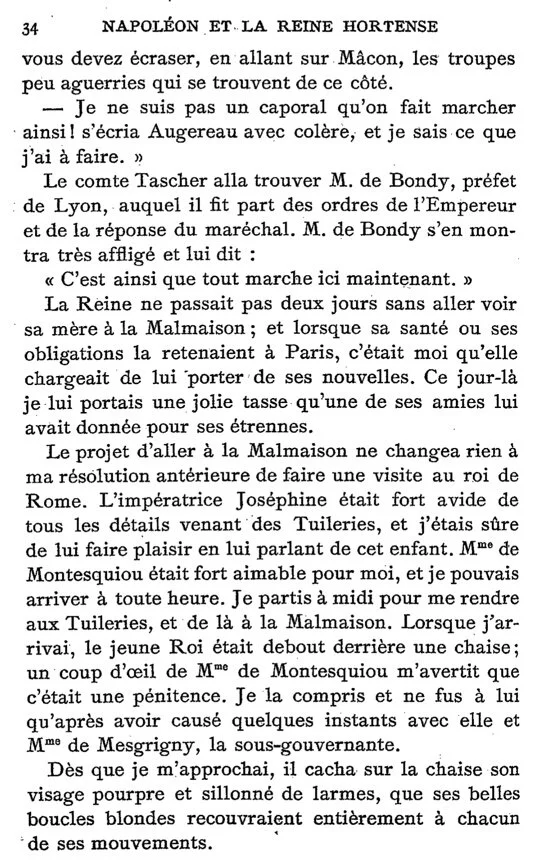Napoléon a été défait par des infiltrés.
This is part of a memoir by Hortense Bonaparte’s confidante Louise Parquin Cochelet. This book opens as Napoleon’s meritocracy based empire is destroyed from within by the enemies of sovereign France. Louise continues to describe, Hortense’s cousin, M. Tascher.
…
[concerning the] events in question: he [Tascher] told me what happened when he had arrived at the imperial headquarters to announce the victory of Eugene to Napoleon.
Napoleon then said to him: "You will stay with me one day: if Marshal Victor makes his move, tomorrow I will have crushed everything in front of me. The Austrians, who ask me for an armistice, will be at my mercy; because they only want it now to buy time.”
The next day, Marshal Victor not having fulfilled the Emperor's expectations, Count Tascher was dispatched to Italy, with verbal orders for Marshal Augereau who commanded at Lyons, for Prince Borghese, governor of Piedmont, and for Prince Eugène, who ruled Italy.
Once Tascher arrived in Lyons, he had all the trouble in the world to penetrate as far as Marshal Augereau, who was in bed.
By dint of persistance, he was finally introduced: "The Emperor wants to tell you, Mr. Marshal”, said Tascher, “that you have 10 to 12,000 experienced troops, 2 cavalry regiments, the 13th division of cuirassiers and the hussars, associated with a gendarmerie made up of old soldiers; that with all these forces and the new levies you must march straight down on Macon, where the body of the Prince of Hamburg’s forces are made up of new troops from all the little German princes; that it will be easy for you to crush them, without worrying about enemy movements which could be made on your right.”
“Do you have written orders?” asked the Marshal.
“No, but as Prince Eugene's aide-de-camp, I can bring verbal ones; and I repeat to you that these are the very expressions of the Emperor, that you must crush, while proceeding to Mâcon, the little seasoned troops which are on this side.”
”I am not a corporal who is ordered around like that!” cried Augereau angrily, and said, “I know what I have to do.”
Count Tascher went to find M. de Bondy, prefect of Lyons, to whom he shared the Emperor's orders and the Marshal's response.
M. de Bondy showed himself very distressed and said to him: "This is how everything works here now.”
…
The Queen did not pass two days without going to see her mother at La Malmaison; and when her health or her obligations kept her in Paris, it was me that she instructed to bring her news.
That day I was carrying her a pretty cup that one of her friends had given as a New Year's gift.
The plan to go to Malmaison did not change my previous resolution to pay a visit to the King of Rome.
Empress Josephine was very eager for all the details from the Tuileries, and I was sure to please her by telling her about this child.
Mme. de Montesquiou [King of Rome, Napoleon François’ caregiver] was very kind to me, and I could show up at any time. I left at noon to go to the Tuileries, and from there to Malmaison.
When I arrived, the young King was standing behind a chair; a glance from Mme. de Montesquiou warns me it was a penance.
I understood it and I did not go to him until after having talked for a few moments with her and Mme. de Mesgrigny, the deputy governess.
As soon as I approached, he hid his purple face, streaked with tears, on the chair, his beautiful blond curls covering him entirely with each of his movements.
…
Cela fait partie d'un mémoire de la confidente de Hortense Bonaparte, Louise Parquin Cochelet.
Ce livre s'ouvre alors que l'empire basé sur la méritocratie de Napoléon est détruit de l'intérieur par les ennemis de la France souveraine. Louise continue de décrire, le cousin d'Hortense, M. Tascher.



